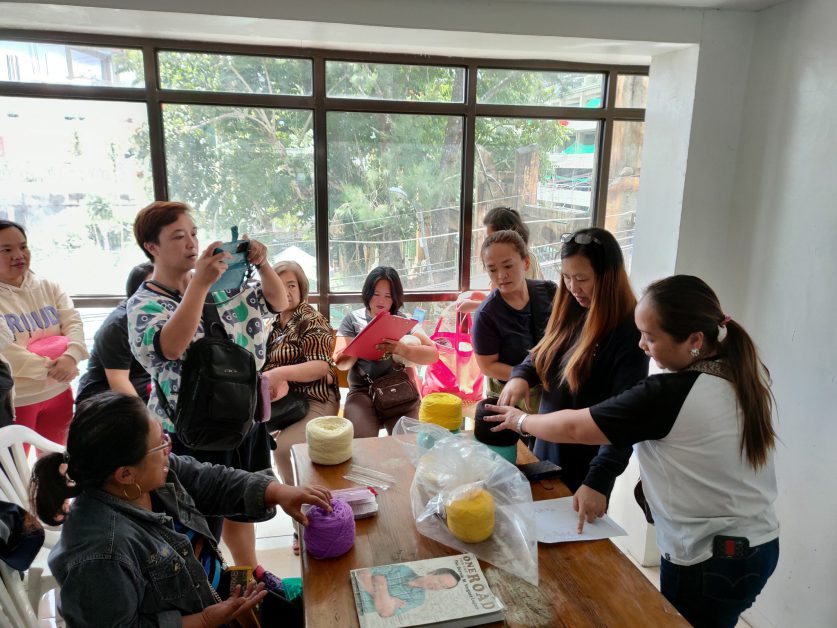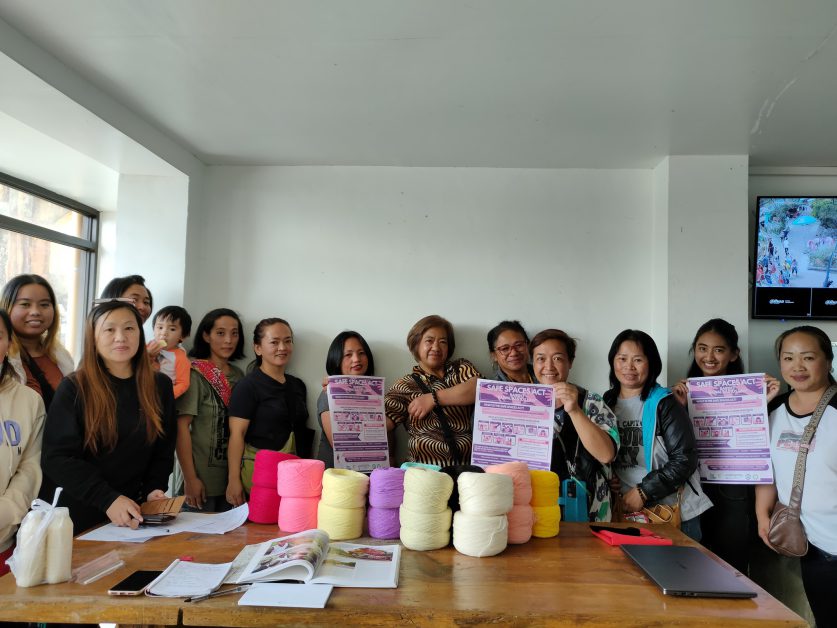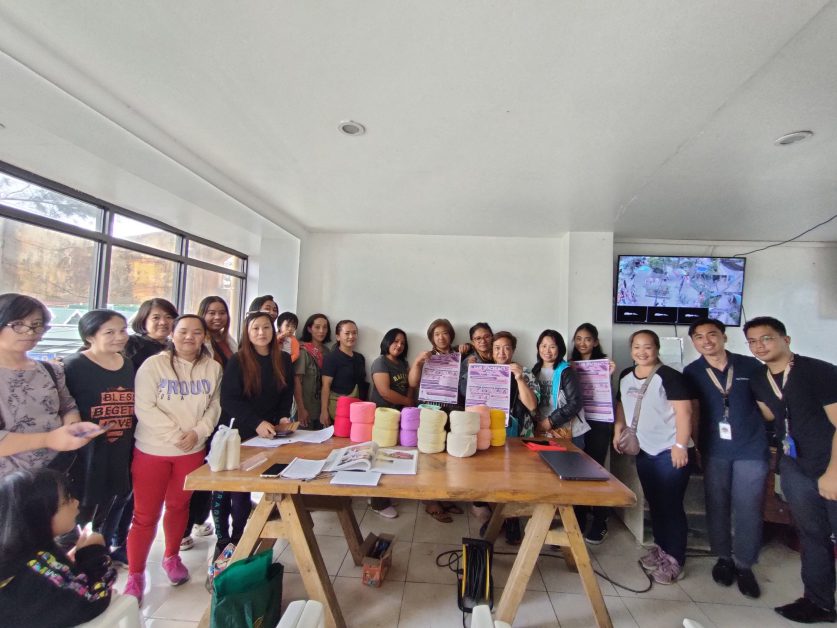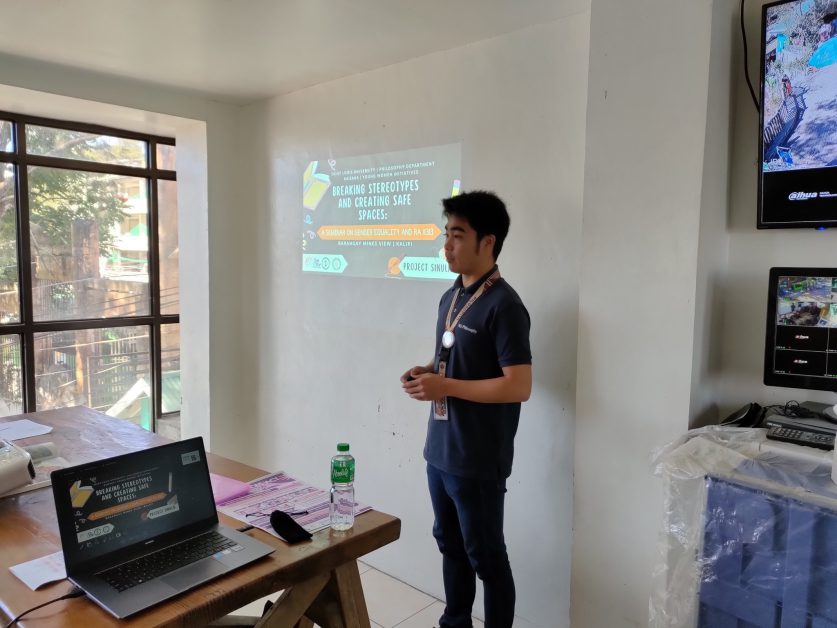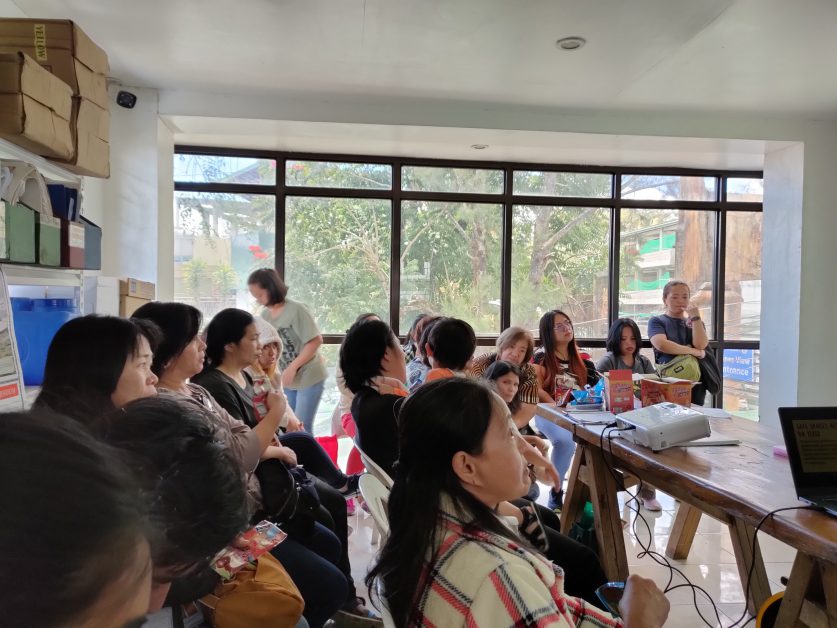On 14 March 2024, the New Louisian Philosophical Society (NEOLOUPHIS), represented by pre-law interns under Saint Louis University’s Philosophy Program and supervision of Attorney Mark Gil Ramolete, MA Philos, JD, LLM (Fariñas-Agustin and Partners Law Office); and in partnership with Kaisa Ka North Luzon and Young Women Initiatives (YouWIn), hosted a seminar entitled “Breaking Stereotypes and Creating Safe Spaces: A Seminar on Gender Equality and R.A. 11313” at Mines View Barangay Hall, which was followed by the first session of Women Kumustahan and first launch of Project Sinulid.
The activities and programs were attended by the members and leaders of Kalipunan ng mga Liping Pilipina (KALIPI). On 18 March 2024, the organization posted an infographic with regards to the Safe Spaces Act (R.A. 11313), known as the “Bawal Bastos” Law, through its Facebook Page. The same infographic was given to Barangay Mines View for dissemination of the provision of the said law.
The goal of the seminar was to further the understanding of women about gender inequality and the gender gap that gravely affects them and everyone else even today. Gender inequality is historically and socially caused which gave birth to the gender gap in all areas of life. Issues in gender are parts of the battle for achieving human rights, and in the goal of resolving them, laws are very important. Hence, the inclusion of the Safe Spaces Act in the seminar is to highlight the acts that need to be eradicated among individuals to achieve gender equality in public, private, and online spaces. Furthermore, the Safe Spaces Act needs to be promoted and disseminated to eliminate all forms of gender-based sexual harassment that are still being noticed and acted on today.
The Women Kumustahan aims to know the situations of women in Barangay Mines View and to introduce to them the idea and establishment of a gender-based violence watch group. Finally, the launch of Project Sinulid is to support the primary livelihood of KALIPI, which is crochet, through the donation of yarn.
The seminar began with an introduction of the International Women’s Month (March) and Day (8 March) by Raymart Nebsan. Afterward, he conducted a pre-test, which was composed of eight (8) questions asking the audience if the task being shown was a task of a woman or a man. The audience responded accordingly. NEOLOUPHIS observed that based on how the attendees participated, social factors can change the perception of gender as time progresses. They also observed that people also were mostly influenced by the changes of perception on gender, wherein they believed that both reproductive and productive works are for men and women.
Nebsan then discussed the influence of society, specifically patriarchal society, towards the perception of individuals regarding gender in connection to thinking, expression, roles, functions, and duties in every sector of society. He explained that the way people perceive tasks in relation to gender is impacted by how society shapes them. He also pointed out that the perception of society towards gender brought about gender stereotypes that categorize both men and women into limited and standardized functions. He also highlighted the idea of hyper stereotypes that may have been developed within individuals, wherein hyper masculinity brings forth the possibility of hypermasculine men being abusive (physically and emotionally) and hyper femininity causes the possibility of hyperfeminine women to be physically and emotionally abused. Hypermasculinity exaggerates the expected characteristics of men, wherein they should aggressively compete with other men and dominate women. Hyperfemininity, on the other hand, makes women to be submissive to men and should always be passive. Thus, hyper stereotypes can strain relationships between people.
Nebsan concluded that stereotypes are the causes or roots of the gender gap and inequality that are still evident today. They are evident when there is discrimination, fewer opportunities due to gender, and gender-based violence. These acts cause unjust results that harm not only victims but also all people. According to Nebsan, if gender stereotypes are to be destroyed, then it paves the way for everyone to become the best versions of themselves. However, he stated that according to studies, it would take hundreds of years to close the gap. That is why in resolving the issues of gender as part of the battle in achieving and maintaining human rights, laws are relevant.
After a short break, Vincent Alain Foronda introduced the discussion on Republic Act 11313 or the Safe Spaces Act (also known as the “Bawal Bastos” Law). He stated that the law covers all forms of gender-based sexual harassment (GBSH) committed in public spaces, educational or training institutions, workplaces, as well as online spaces. He specified the spaces where the law prohibits GBSH, which include streets, roads, alleys, public recreational spaces, churches, transportation, public buildings, government offices, schools, restaurants, bars, public markets, and online platforms. He also emphasized that the law does not exclude any perpetrators. People on the street, with authority and/or influence, peers, subordinates, and minors are all prohibited by law to commit GBSH.
Cheyanne Tiago furthered the discussion by explaining the acts that are considered gender-based sexual harassment, which include catcalling and/or wolf whistling, groping, public masturbation, or flashing; misogynistic, transphobic, homophobic, or sexist slurs; unwanted sexual remarks, comments, and/or suggestions; any physical or verbal advances, unwanted invitations, relentless requests for personal information, and uninvited comments or gestures on a person’s appearance. She also stressed that in the workplace, any unwelcome sexual advances, requests or demands for sexual favors, and acts of a sexual nature are prohibited. Conducting a sexual nature or other conduct on sex affecting a person’s dignity, which is unwelcome, unreasonable, and offensive to the recipient is also punishable by the law. And unwelcome pervasive conduct creating intimidation, hostile, or humiliating environments for the recipient are also included.
Christian James Matammu also gave aid and extensively discussed how we can save digital evidence and report perpetrators who violated and will violate the law online. Online gender-based sexual harassment acts include physical, psychological, or emotional threats; impersonation of victims online or posting lies about victims, uploading and sharing photos or/and videos of victims without consent; cyberstalking, incessant messaging, and filing false abuse reports to online platforms to silence victims. Matammu also advised on what to do when we witness someone committing GBSH in different spaces. He also stressed the assistance we are entitled to if we report a case of gender-based sexual harassment. Finally, Matammu also answered the Frequently-Asked-Questions (FAQs) regarding the provisions of the law.
The program continued with a question-and-answer portion to clarify unclear information discussed and other significant matters that were not discussed. A post-test was also conducted to assess the effectiveness of the seminar.
As the discussion progressed, the participants, through Kumustahan, shared their experiences of GBSH. Some of them asked questions about what they could do in situations that were not discussed. Some of them also shared insights on what role they should take part in as mothers in the family and citizens of the barangay because GBSH is evident anywhere around their place. The others also suggested that men should also be educated about gender equality and the Safe Spaces Act because many among them are not aware that what they are doing are already acts of harassment and punishable by law. The interns responded accordingly and took note of the ideas and propositions shared by the participants.
Raymart Nebsan concluded the session by discussing the Gender-Based Violence Watch Group and putting emphasis on why people should be aware of gender-based violence happening in society. He asked the participants who among them would be willing to become part of the GBV watch group. Volunteers to be part of the watch group will be equipped with increased knowledge about VAW and GBV, skills, and tools in providing intervention for prevention and immediate response to cases of violence. They suggested that the members of the said watch group should be the leaders of their organization. The interns stated that the GBV watch group will be elaborated on in the second session of the Kumustahan.
After the discussion, the interns announced the first launch of Project Sinulid. Raymart Nebsan explained that the project is to help aid the livelihood of KALIPI wherein, the interns will be donating yarn to the organization. The project shall also be monitored monthly during sessions of Kumustahan to assess the progress of the project.
Evaluation forms were distributed randomly to the participants and were collected after several minutes. The series of events ended with a closing remark.
The programs accomplished follow the Sustainable Development Goal (SDG) 5, wherein they empower women with knowledge about the causes of gender inequality and ways to overcome any form of gender-based sexual harassment that continues to persist even today. Hence, the seminar gave them access to data/information about the contemporary yet historical issue of gender. The programs likewise fall under SDG 10, wherein the Women Kumustahan and Project Sinulid being part of the seminar underpin the need of women and the Kalipunan ng mga Liping Pilipina (KALIPI) to become part of the economic development of the community through their crochet livelihood and to help them maintain a sustainable and inclusive society. Finally, the programs also fall under SDG 17, wherein partnership with KAISA KA North Luzon, Young Women Initiatives (YouWIn), and Barangay Mines View define the success of every activity accomplished in promoting gender equality and reducing inequalities in society.
In relation to the CICM Advocacies, the series of events also promotes the commitment towards the integrity of creation by acknowledging through the seminar that human beings are part of creation and that integrity should never be removed from anyone. The Safe Spaces Act being promoted on Social Media Platforms and included in the seminar is part of the battle in attaining justice and peace, wherein through the dissemination of information, people will learn to respect others, not commit crimes, and face any form of gender-based harassment. (New Louisian Philosophy Society)
Photos from NEOLOUPHIS Facebook page.
